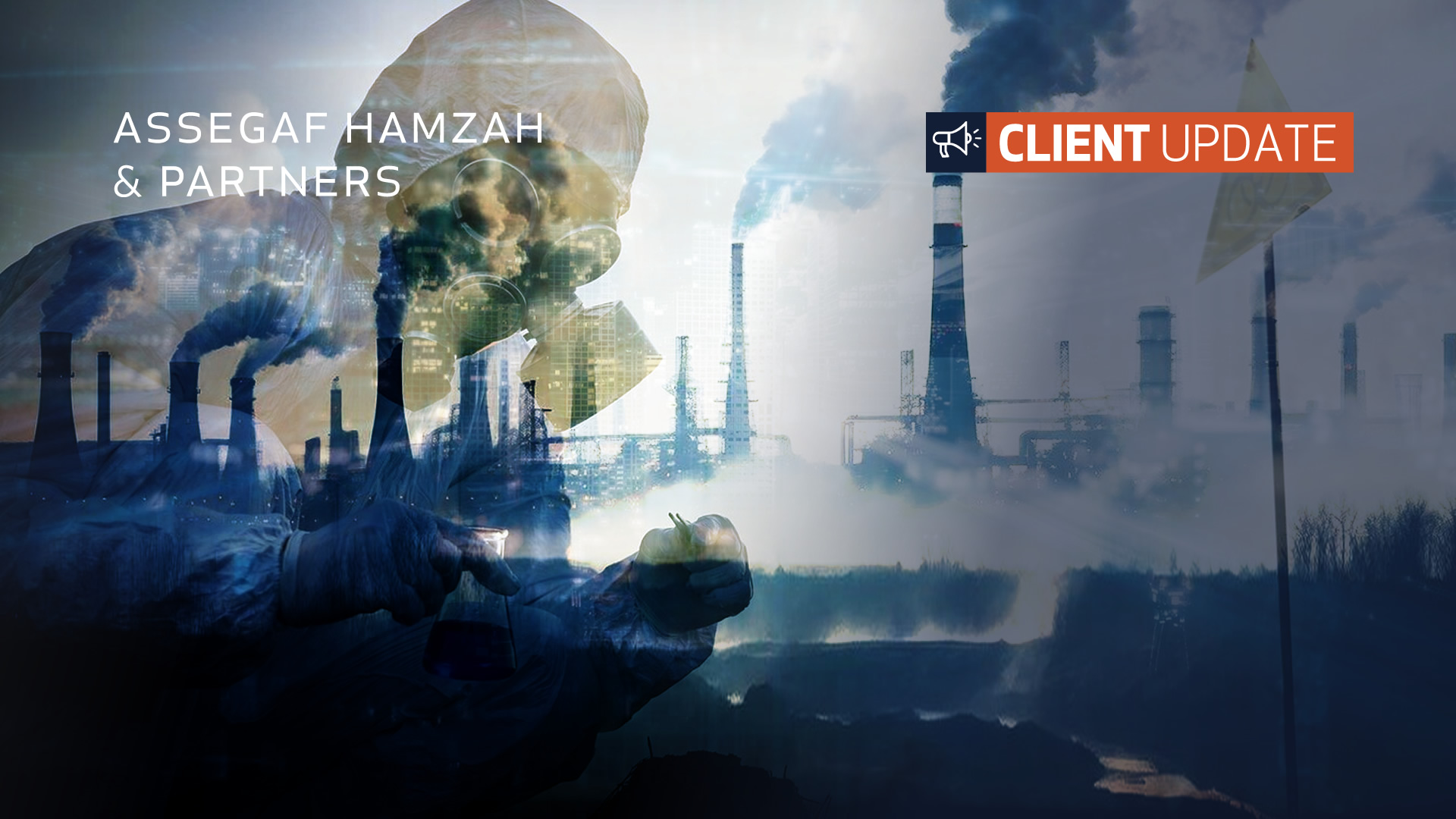Indonesia’s Carbon Capture and Storage (CCS) Regulatory Overview: Steps to become Asia-Pacific Hub?

Countries and companies are setting aggressive net-zero emission targets, and Indonesia is in top gear in ensuring that carbon capture, and storage (“CCS”) is available as one of the necessary tools to reach its domestic net-zero target in 2060. In less than one year span, the Indonesian government has enacted three CCS-related regulations, namely:
-
Minister of Energy and Mineral Resources (“MEMR”) Regulation No. 2 of 2023 on the Implementation of Carbon Capture and Storage and Carbon Capture, Utilisation and Storage for Upstream Oil and Gas Business Activities;
-
SKK Migas Working Guideline No. PTK-070/SKKIA0000/2024/S9; and
-
Presidential Regulation No. 14 of 2024 on the Implementation of Carbon Capture and Storage (“Presidential Regulation 14/2024”).
As a foreword, CCS is not a new technology. In fact, it is a half-century old upstream oil and gas technology that is traditionally used to enhance oil and gas recovery or reduce emissions deriving from oil and gas operations. Because it derives from the upstream business, the regulatory process replicates and builds on the existing processes and processes in the upstream business.
The latest regulation, Presidential Regulation 14/2024, is intended to bridge all the regulatory gaps and cover all possible scenarios, areas of concern, and monetisation. This client update will provide an overview of the current regulatory framework:
-
How and where to do CCS operations in Indonesia;
-
Tax incentives;
-
CCS business process;
-
Monetisation and carbon credit;
-
Post operations and limitation of liability;
-
Foreign investment restrictions;
-
Potential sanctions.
Based on this overview, we will then examine whether the industry have everything they need from regulatory perspective to underpin investment decisions in building a CCS hub envisioned by the government.
How and where to do CCS Operations in Indonesia
There are two ways to do CCS operation in Indonesia: (i) in an existing production sharing contract (“PSC”) block; or (ii) in an area outside an existing PSC block, designated as CCS area.
Existing oil and gas blocks
For CCS project implemented within a PSC block, it will be integrated to the PSC block’s petroleum operations. The CCS project must be approved by the government in the contractor’s plan of development (“POD”) and, in addition, the PSC would need to be amended to capture some of the CCS terms and conditions, among others, the commercial terms and monetization (if it envisages storing third party’s emitters’ carbon), liability, and the designated ‘Injection Target Zones’.
Carbon emissions will be injected and sequestered into designated “Injection Target Zones” within onshore or offshore reservoirs in the PSC’s working areas. These zones include depleted reservoirs, non-conventional reservoirs, saline aquifers, or underground coalbed methane seams. The storage must be certified by an independent verifier approved by SKK Migas (the Taskforce for Upstream Oil-and-Gas Business Activities or Satuan Kerja Khusus Pelaksana Kegiatan Usaha Hulu Minyak dan Gas Bumi).
The costs to implement the CCS project, including financing costs, could be cost recovered under the PSC and any revenues deriving from the CCS project would be used by the PSC contractors to offset their operating costs.
Designated CCS area
By enacting Presidential Regulation 14/2024, CCS projects may be implemented to injection target zones that are not located within an existing PSC block. To do this, the government will designate a permitted carbon storage area (“Designated CCS Area”) and will tender the area to potential CCS operators to explore, and then to operate. The process is as follows:
-
Tender process
If the designated area was identified and proposed by a private entity, the government has the option to conduct a limited tender instead of an open tender. The private entity proposing for the area will be given a ‘right to match’ during the tender process. The tender procedures for determining the boundaries and the applicable commercial terms of the Designated CCS Area will be further stipulated in a separate MEMR regulation.
-
CCS Exploration Permit
If the Designated CCS Area is awarded, the private entity will be given an exploration permit (“CCS Exploration Permit”) for six years, which may be extended once for four years. The exploration program, which must be approved by the MEMR, will include a set of ‘firm exploration commitments’ to identify and determine the injection target zone. These commitments will be secured with a performance bond in favour of the government.
-
CCS POD
If the exploration activities found a suitable injection target zone that could be used to store carbon commercially, then the holder of the CCS Exploration Permit may propose a CCS plan of development (“CCS POD”) to the government for approval.
-
CCS Operation Permit
If the CCS POD is approved, the CCS operator will be awarded a CCS operation permit (“CCS Operation Permit”) to realise the development, construction, and operation of the project.
The CCS Operation Permit will be valid for 30 years, extendable for 20 years. The commercial terms of the CCS Operation Permit will include an obligation to pay royalty to the government and fund the post operation obligations (which we will discuss in more details below). As Presidential Regulation 14/2024 does not specify the royalty amount, we expect it to be clarified during the tender phase.
Tax Incentives
To support the implementation of CCS, the PSC contractor or CCS operator may be eligible for specific incentives as outlined in the relevant laws, including tax incentives that apply to upstream oil and gas business activities. However, these incentives are subject to further implementation regulations in the tax sector, which generally fall under the purview of the Ministry of Finance. As of now, we are not aware of any implementing regulations issued by the Ministry to govern such incentives, and anticipate that it will be clarified under a separate regulation.
CCS Business Process
We can generally classify the CCS business process under the current regulatory framework into the following categories:
-
Capture
The government is not concerned with the method of carbon capture as the regulations acknowledge all carbon capture methods. However, the carbon must be purified to the level that meets the Indonesian national standard (ref: SNI ISO 27914:2017), or other international standards acknowledged by the government.
-
Transport
Domestic transportation of carbon emission to the injection and sequestration site will require a separate carbon transport permit (“Carbon Transport Permit”). The MEMR has the authority to issue the Permit if the transport is by means of inland or underwater pipeline, while the Ministry of Transportation will have the authority to issue the permit if the transport is by means of ship or trucking.
-
Injection and sequestration
70% of the carbon storage capacity is reserved for domestic emissions, and foreign carbon emissions are allowed only if (i) there is a bilateral cooperation; and (ii) the offshore emitters have investment in Indonesia. We consider this as the government’s strategy to invite other countries to share the burden of reducing emissions.
The CCS injection and sequestration operations to the injection target zone must adhere to the Indonesian national standard (which adopts the ISO standard) and general good engineering practice.
-
Measurement, reporting, and verification/validation
During the CCS operation phase, the PSC contractor or CCS operator must conduct measurement, reporting, and verification/validation (MRV). This process essentially aims to ensure the accuracy and credibility of the volume of carbon captured, transported, and stored, the oversight to the risk related to the CCS operations, and the credibility of the carbon credit initiatives. This is also why the verification process must be reported to the national climate change registry system (SRN – Sistem Registri Nasional (menlhk.go.id).
-
Closure of CCS activities
The CCS operations may be closed if the storage capacity reaches its full capacity, if the underlying permit (PSC or CCS Operation Permit) expires, if a safety incident or force majeure event occurs, or simply if the CCS operation is no longer economical. Closure requires the MEMR’s approval, which is contingent upon verifying that the operator has put in place all necessary safeguards to ensure the integrity of the carbon storage.
Monetisation and Carbon Credit
The value, benefit, rights, and/or any entitlement of any carbon credits earned with respect to the project is allocated to the operator of the CCS project. However, if the operator is a PSC contractor and the carbon credit buyer is located outside Indonesia – thus requiring the PSC contractor to transfer the greenhouse gas emission reduction certificate outside Indonesia – the PSC contractor must obtain SKK Migas’ authorisation to do so.
The PSC contractor or CCS operator may sign a commercial contract to store a third party’s carbon emissions in exchange for a payment of a storage or toll fee. The MEMR is expected to issue a separate regulation to clarify the details of the storage or toll fee.
Post Operation Liability
The regulatory framework provides that the PSC contractor or CCS operator’s liability will end and be transferred to the government when:
-
The CCS facilities are officially closed as verified by the MEMR;
-
The underlying permit (either the PSC or CCS Operation Permit) have expired or been relinquished; and
-
There were no leaks, contamination, unplanned carbon movement, or other risks detected during the 10-year monitoring period.
However, it is not clear from the regulation whether the 10-year monitoring period will be the base case liability period for the PSC contractor or the CCS operator. In any event, the operator or contractor must monitor the CCS storage, regularly reporting the monitoring activities to the government, 10 years after the closing of the CCS operations. The monitoring activities must essentially include plans to identify and overcome leaking risk, ground water contamination, injection target zone integrity and other related risks. In addition, the operator must establish a reserve fund in an escrow account to cover the monitoring expenses and any mitigation action to overcome any leak or contamination.
Ownership for the CCS assets in a PSC block will follow the rules in upstream oil and gas, and will be the state asset. CCS assets under a CCS Operation Permit, however, will remain as the CCS operator’s asset.
Potential Sanctions
All sanctions are administrative in nature, ranging from warning letters, suspension of business activities, to revocation of the underlying permits.
Foreign Direct Investment Restrictions
There are no foreign direct investment restrictions that apply to the upstream oil and gas activities and CCS. Nonetheless, a CCS Operation Permit and Carbon Transport Permit may only be granted to an Indonesian limited liability company and there is a share transfer restriction period.
With respect to carbon transportation through ship, it is not clear from the regulations whether the holder of a Carbon Transport Permit will also be required to obtain a shipping business license or SIUPAL. If that is the case, then it will also be subject to the cabotage rules under the Indonesian shipping law. Cabotage rule requires all shipping companies operating within Indonesian waters to be owned at least 51% by Indonesian citizen or Indonesian domestic company.
Conclusion
The latest Presidential Regulation 14/2024 is a breakthrough and provides a comprehensive regulatory framework that may pave the way for CCS development. However, there remain some gaps that require clarification from further implementing regulations, including the amount of royalty payable under the CCS Operation Permit, requirements for the bilateral cooperation to store offshore carbon emissions in Indonesia, the limitation of liability of a CCS operator after the 10-year monitoring period, and tax incentives.
While hydrocarbon would still be required to meet the world's energy demands, CCS will be one of the important tools to reduce the worlds greenhouse gas emissions. The establishment of a successful hub does not depend solely on the regulatory network. It would be contingent upon finding the right injection target zone, multilateral policies and regional cooperation to establish a long value chain between emitters, transporters, and storage providers. Equally important, financiers and countries would need to consider other financial yardstick to measure the economics of a CCS project.


